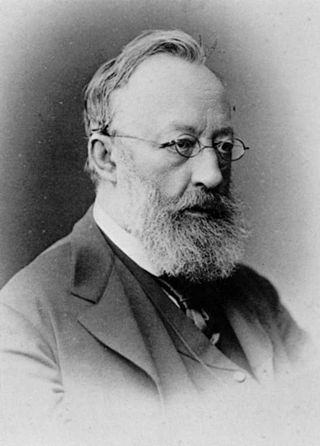
Gottfried Keller was a Swiss poet and writer of German literature. Best known for his novel Green Henry and his cycle of novellas called The People from Seldwyla, he became one of the most popular narrators of literary realism in the late 19th century.

Paul Johann Ludwig von Heyse was a distinguished German writer and translator. A member of two important literary societies, the Tunnel über der Spree in Berlin and Die Krokodile in Munich, he wrote novels, poetry, 177 short stories, and about sixty dramas. The sum of Heyse's many and varied productions made him a dominant figure among German men of letters. He was awarded the 1910 Nobel Prize in Literature "as a tribute to the consummate artistry, permeated with idealism, which he has demonstrated during his long productive career as a lyric poet, dramatist, novelist and writer of world-renowned short stories." Wirsen, one of the Nobel judges, said that "Germany has not had a greater literary genius since Goethe." Heyse is the fifth oldest laureate in literature, after Alice Munro, Jaroslav Seifert, Theodor Mommsen and Doris Lessing.

Johann Ludwig Tieck was a German poet, fiction writer, translator, and critic. He was one of the founding fathers of the Romantic movement in the late 18th and early 19th centuries.

Christoph Martin Wieland was a German poet and writer. He is best-remembered for having written the first Bildungsroman, as well as the epic Oberon, which formed the basis for Carl Maria von Weber's opera of the same name. His thought was representative of the cosmopolitanism of the German Enlightenment, exemplified in his remark: "Only a true cosmopolitan can be a good citizen."

Georg Philipp Friedrich Freiherr von Hardenberg, pen name Novalis, was a German aristocrat and polymath, who was a poet, novelist, philosopher and mystic. He is regarded as an influential figure of Jena Romanticism.
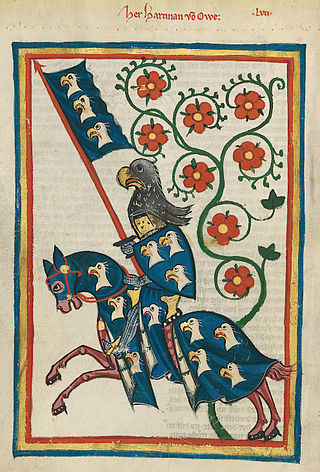
Hartmann von Aue, also known as Hartmann von Ouwe, was a German knight and poet. With his works including Erec, Iwein, Gregorius, and Der arme Heinrich, he introduced the Arthurian romance into German literature and, with Wolfram von Eschenbach and Gottfried von Strassburg, was one of the three great epic poets of Middle High German literature.
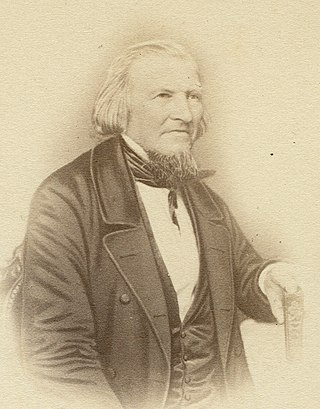
August Heinrich Hoffmann was a German poet. He is best known for writing "Das Lied der Deutschen", whose third stanza is now the national anthem of Germany, and a number of popular children's songs, considered part of the Young Germany movement.
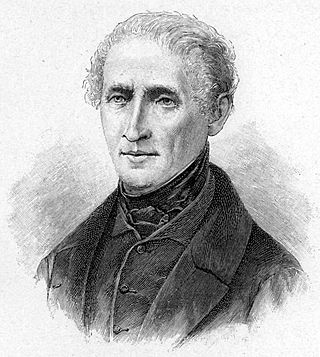
Joseph Freiherr von Eichendorff was a German poet, novelist, playwright, literary critic, translator, and anthologist. Eichendorff was one of the major writers and critics of Romanticism. Ever since their publication and up to the present day, some of his works have been very popular in German-speaking Europe.
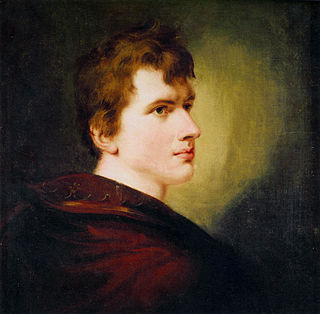
Carl Joachim Friedrich Ludwig von Arnim, better known as Achim von Arnim, was a German poet, novelist, and together with Clemens Brentano and Joseph von Eichendorff, a leading figure of German Romanticism.

Julius Sturm, German poet, was born at Köstritz in the principality of Reuss.

Wilhelm Heinrich Wackenroder was a German jurist and writer. With Ludwig Tieck and the Schlegel brothers, he co-founded German Romanticism.
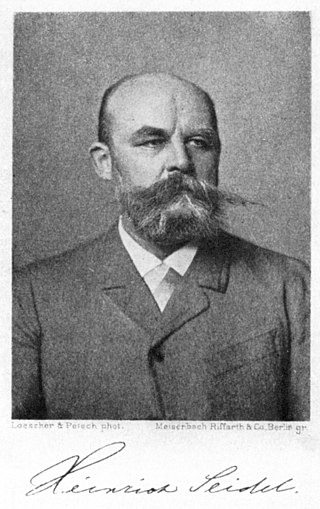
Heinrich Friedrich Wilhelm Seidel was a German engineer, poet and writer.

Eduard Julius Friedrich Bendemann was a German-Jewish painter.
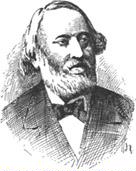
David Cassel was a German historian and Jewish theologian.

Wilhelm Bölsche was a German author, editor and publicist. He was among the early promoters of nature conservation and committed to popularizing science.
Christian Heinrich Postel was a German jurist, epic poet and opera librettist, who wrote 28 libretti for the Oper am Gänsemarkt in Hamburg: set by composers such as Johann Philipp Förtsch, Reinhard Keiser and Georg Philipp Telemann. His texts for a St John Passion were set by composers Christian Ritter, Johann Mattheson and Johann Sebastian Bach in their respective St John Passion.
The Kürschners Deutscher Literatur-Kalender is a reference work that currently contains around 12,000 bio-bibliographic articles and addresses of writers of German literature, as well as translators, publishers, agencies, radio stations, writers' associations, academies, literary magazines and feuilletons, literary prizes and awards in the German-speaking countries. Currently it is published every other year in two volumes by the publisher Walter de Gruyter. The reference work is named after the specialist in German studies Joseph Kürschner.
Hermann Andreas Pistorius was a German Protestant-Lutheran theologian and clergyman, philosopher, reviewer, translator and writer. During his lifetime he was regarded as "the most learned man on Rügen".

Hanns Theodor Wilhelm Freiherr von Gumppenberg was a German poet, translator, cabaret artist and theatre critic. He used the pseudonyms Jodok and Professor Immanuel Tiefbohrer.

Gustav Adolf Kröner, from 1905 von Kröner, was a German publisher and chairman of the Börsenverein der Deutschen Buchhändler. He became particularly well known for his demand for fixed prices for books, which was implemented in the so-called Kröner Reform and is still in force today. The publishing houses he managed, especially J. G. Cotta'sche Buchhandlung, which he had acquired and expanded in 1889, were also among the most important publishers in the field of humanities and literary publications, especially at the beginning of the 19th century and 20th centuries.


















